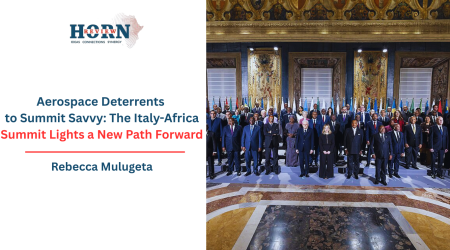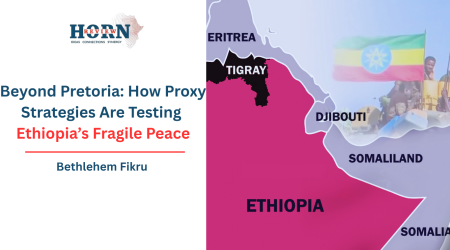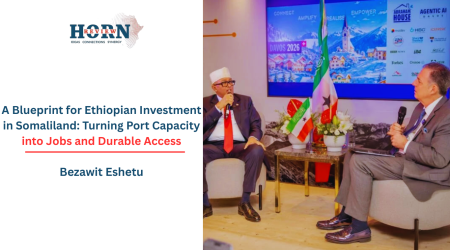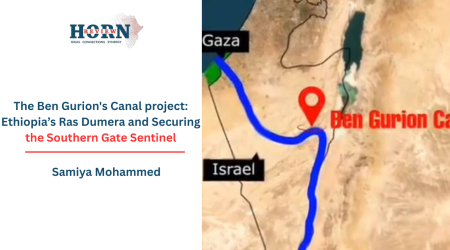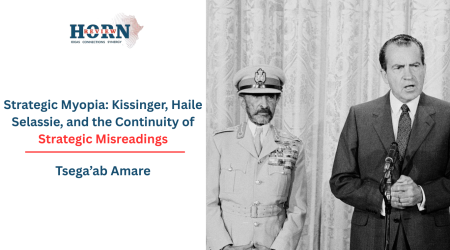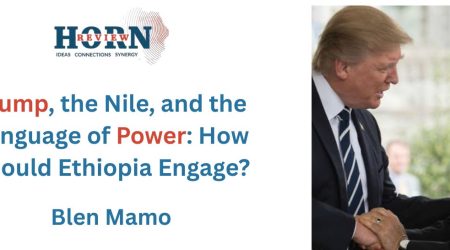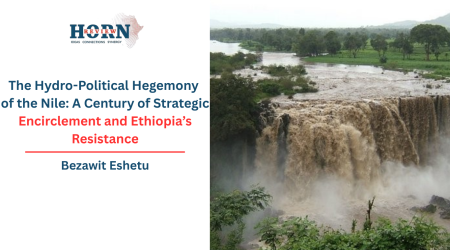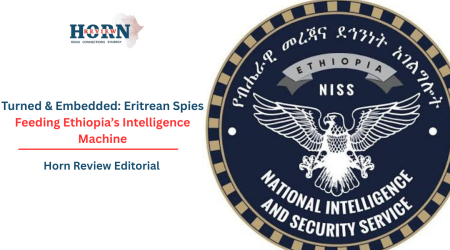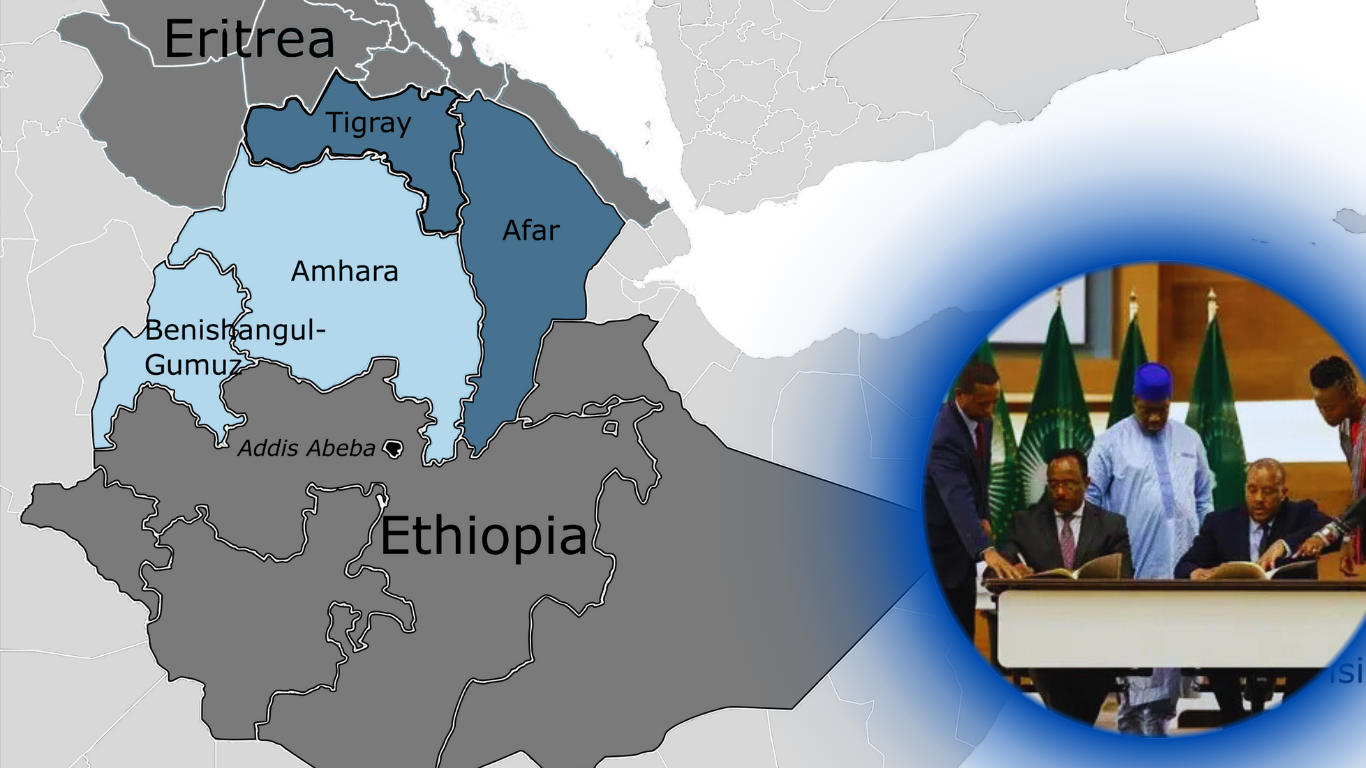
30
Jul
Ethiopia’s Strategic Imperative: Counteracting External Destabilization and Internal Factionalism
Two and a half years after the hard-won Pretoria Peace Agreement, a threat of renewed war hangs over northern Ethiopia, casting a shadow over the country’s dreams for unity and overall development. Reports that Tigrayan commanders are reorganizing their military command structure to face a possible fight with Eritrea, and reports of a faction of the Tigray People’s Liberation Front (TPLF) cooperating with Asmara, spell a hazardous trajectory. For Ethiopia, a nation still grappling with fresh war wounds and striving for all-round development, these events pose a direct threat to its essential national interests: unity, sovereignty, and aspirations for a better future.
At the center of the increasing tension lies Eritrea’s abiding strategic interest in a humbled and internally fractured Ethiopia. In the words of Horn of Africa expert Gerrit Kurtz, in short, “Eritrea benefits when Ethiopia is weakened when it’s internally fractured and plagued by local conflicts” (G. Kurtz, as quoted in DW, n.d.). It is not a casual statement but a policy dictation of Asmara’s foreign policy. One united, stable, and emerging economic force of Ethiopia necessarily poses a threat to the regional standing and long-term security calculus of Eritrea. In creating internal divisions and proxy conflicts, Eritrea aims to discourage Ethiopia persistently from focused national development and regional dominance.
The evidence for Eritrea’s active role in this Destabilization Axis – a politicized term for the clandestine coalition of foreign and local actors that aim to break up Ethiopia is growing increasingly unavoidable. Eritrea’s alleged training and arming of various armed groups within Ethiopia. These are not instances of spontaneity but calculated attempts at provoking and prolonging internal conflict, ensuring Ethiopia remains locked in a debilitating violence cycle.
Aside from direct military engagement, Eritrea’s contribution to the war in Tigray also carried a predatory economic component, meticulously detailed by the US monitoring group The Sentry. Their investigations uncovered “systematic looting of Tigray during the war,” with “factories being dismantled and shipped across the border” and “everything of value was sent to Eritrea” (Cater, quoted in DW, n.d.; The Sentry, n.d.). Furthermore, The Sentry exposed Eritrea’s enrichment from “illicit trade,” which includes smuggling precious resources such as gold, sesame, and cultural relics, as well as human trafficking from Tigray. The foreign exchange derived from such illegal acts is reported to have directly funded Eritrea’s ongoing military activities in Ethiopia, thus perpetuating a war-and-exploitation cycle that directly threatens Ethiopia’s economic stability and human security.
It is also the pattern of behavior that explains Eritrea’s subtle reaction towards the 2018 peace deal. While Prime Minister Abiy Ahmed was awarded the Nobel Peace Prize for the agreement, the surprise left out Eritrean President Isaias Afwerki. Although the agreement led to the lifting of the UN arms embargo against Eritrea, The Sentry documented Eritrea’s subsequent arms acquisitions, including with Russia (The Sentry, n.d.). This would mean that with Asmara, the peace deal was less about reconciliation and more about taking advantage of a strategic chance at re-armament and re-positioning, perhaps still hurting from perceived lack of acknowledgment and seeking to maintain a threatening leverage in regional relations.
In this context, the re-establishment of an integrated military command chain in Tigray, said to be under TPLF chairman Debretsion Gebremichael, is a determining factor for Ethiopia’s national interest. This nine-person entity, made up of five members from the military and four party members, flagrantly violates the intention and aim of the Pretoria Agreement, which emphasized disarmament and reintegration. While General Tadesse Werede, Tigray’s interim government leader, has urged restraint and committed “no war and no provocation from Tigray’s side,” the fact that re-militarization is being done by a regional power in an independent nation undermines federal control and risks reviving a devastating conflict.
The intra-Tigray politics also appear to be complex, with Debretsion Gebremichael’s faction being accused of conspiring with Eritrea – something it strongly denies. But even this accusation, valid or not, indicates a poisonous political arithmetic. With the colossal human cost and devastation, in particular to the Tigrayan people whose blood has been spilled, the continued quest for a sectarian, party-driven agenda by actors within the TPLF raises profound questions. Is the re-militarization truly in the best interest of the Tigrayan people, or a gamble on their future for the agenda of a few?
Unfortunately, it is true that the youth of Tigray have undergone “political turmoil, criminality, and forced exile under TPLF leading to an enduring despair.” Decades of conflict have laid waste to infrastructure, disrupted education, and ruined economic prospects, leaving a generation disillusioned and vulnerable. If political parties make re-militarization and temporary political gains take precedence over real peace, reconstruction, and human security, they are in fact the authors of their nation’s continued miseries. It suggests a moribund political institution’s final desperate effort to extend its lifespan on the back of the desperation of the younger generation and at the cost of its own longevity in the region. These are not the doings of leaders working for their people but those of leaders working for their self-preservation and therefore, in this way, enemies to the welfare of their own citizenry.
The alliance of Eritrea’s policy of destabilization and re-militarization in Tigray significantly increases the threat of proxy wars. While an outright inter-state war is unlikely, such illegal networks and destabilizing alliances pose a more insidious threat. Such wars siphon off national resources in Ethiopia, divert the government’s attention from key development projects (such as the Grand Ethiopian Renaissance Dam), and undermine the “Horn First” policy of regional integration and collective prosperity. They create a climate of continuous insecurity, deterring investment and exacerbating humanitarian crises, directly counter to the national strategy of Ethiopia for rapid and enduring development.
To safeguard the national interest of Ethiopia, Ethiopia must adopt a strong and multi-faceted position. First, Ethiopia must unambiguously declare its federal authority and defend the integrity of the Pretoria Peace Agreement. This involves guaranteeing that no component within promises an autonomous military command that breaches the country’s constitutional structure. Sustained pressure through diplomacy on the interim Tigrayan government to abide by the disarmament, demobilization, and reintegration (DDR) conditions fully, with timelines and robust measures of accountability, is essential to solidifying peace and safeguarding lives.
Second, Ethiopia must try harder to counter Eritrean destabilization by breaking up the Destabilization Axis and its criminal networks. This calls for expanding intelligence capability, securing borders, and aggressively exposing the economic exploitation that reports like The Sentry have revealed. Diplomatically, Ethiopia must continue to isolate Eritrea’s destabilizing strategy from regional and international opinion, advocating targeted sanctions against individuals or groups verifiably involved in illicit trade and proxy support. The strong move is critical in halting further attack and protecting Ethiopia’s economic stability and human security.
Third, durable peace will rely on a sustained commitment to pay attention to people-centered security and inclusive government. The widespread hopelessness among Tigrayan youth and other impacted groups must be addressed with fervor and forward momentum. This involves accelerating reconstruction efforts, holding actors accountable for access to justice, promoting genuinely representative political participation, and building sustainable economic prospects. Through addressing these internal sources of vulnerability, Ethiopia can effectively deny spoilers a recruitment base and construct authentic, sustainable peace bottom-up.
Fourth, Ethiopia’s geopolitical position in the Horn of Africa also calls for an active and smart regional diplomacy. Through its “Horn First” policy, Ethiopia needs to construct authentic, equitable alliances within regional institutions like IGAD and the African Union. This would mean driving for stronger mechanisms of regional conflict prevention, mediation, and economic integration that will make fragmentation costly and unappealing to everyone. Negotiation with Eritrea, with a firm red line against destabilization, can remain on the table but only on the condition of solid guarantees of peace and non-interference in internal affairs.
The tensions in northern Ethiopia currently, which are exacerbated by Eritrea’s intentional strategy of fragmentation and the dangerous wager of some Tigrayan forces, are a serious threat to the national interest of Ethiopia. Ethiopia’s future in building a stable and prosperous future hinges on its ability to firmly defend against outside destabilization, foster true internal reconciliation, and ensure that the desires of its people come ahead of self-serving, short-run political pragmatism. By guiding its people through this crucible of testing with unwavering resolve and long-term strategic vision, Ethiopia can secure its integrity and be the stable anchor the Horn of Africa so needs.
By Bethelhem Fikru,Researcher,Horn Review
References
- Africa Intelligence. (2025). Eritrea, Ethiopia: Tigray Readiness its Military Leadership of War.https://www.africaintelligence.com/eastern-africa-and-the-horn/2025/07/16/tigray-readies- its-military
- Carter (2025), referenced DW report that indicated Eritrea’s role as new Tigray War Looms in Ethiopia.
- David Ehl. (2025). A look at Eritrea’s role as the new Tigray War looms in Ethiopia. DW, :https://www.dw.com/en/a-look-at-eritreans-rolr-as-new-tigray-war-looms-in-ethiopia/a-73283778
- Kurtz, G. (n.d.). ‘Abiy’s Strategy in keeping domestic rivals weak.’ As cited in the DW interview.
- Martin Plaut. (2025). A look at Eritrea’s Role as the new Tigray War looms in Ethiopia. Journalist Specialising in the Horn of Africa and Southern Africa.

